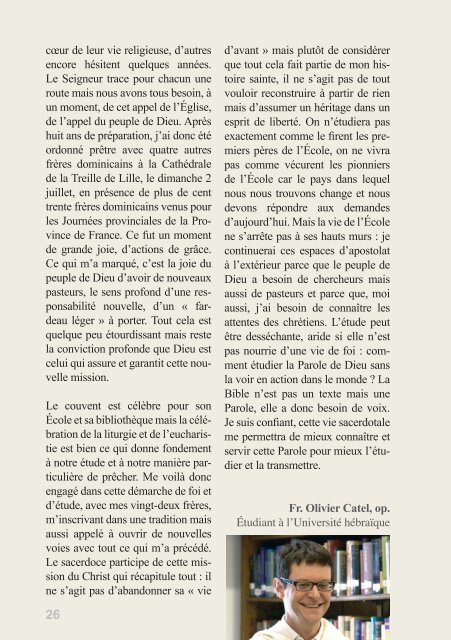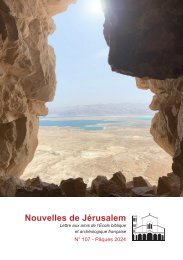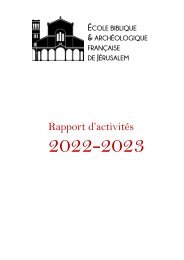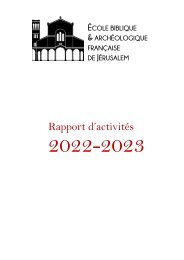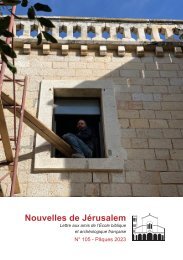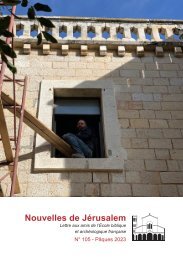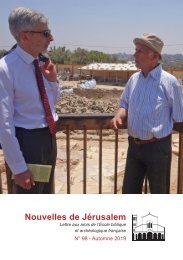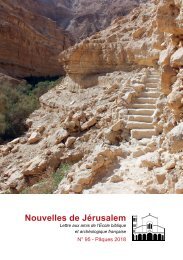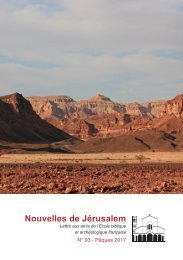NOUVELLES DE JÉRUSALEM - Automne 2017
Les Nouvelles de Jérusalem sont une revue d'informations de l'École biblique et archéologique française de Jérusalem, 2 à 3 fois par an, elles donnent un aperçu des travaux en cours en exégèse comme en archéologie, ici à Jérusalem. En voici le deuxième numéro couleurs en ligne. Les articles alternent français et anglais. The Nouvelles de Jérusalem is an information review of the École Biblique et Archéologique française de Jérusalem, 2-3 times a year, they give an overview of the work in progress in both exegesis and archeology, here in Jerusalem. Here is the second color edition online. Articles are sometimes in French sometimes in English.
Les Nouvelles de Jérusalem sont une revue d'informations de l'École biblique et archéologique française de Jérusalem, 2 à 3 fois par an, elles donnent un aperçu des travaux en cours en exégèse comme en archéologie, ici à Jérusalem. En voici le deuxième numéro couleurs en ligne. Les articles alternent français et anglais.
The Nouvelles de Jérusalem is an information review of the École Biblique et Archéologique française de Jérusalem, 2-3 times a year, they give an overview of the work in progress in both exegesis and archeology, here in Jerusalem. Here is the second color edition online. Articles are sometimes in French sometimes in English.
Create successful ePaper yourself
Turn your PDF publications into a flip-book with our unique Google optimized e-Paper software.
cœur de leur vie religieuse, d’autres<br />
encore hésitent quelques années.<br />
Le Seigneur trace pour chacun une<br />
route mais nous avons tous besoin, à<br />
un moment, de cet appel de l’Église,<br />
de l’appel du peuple de Dieu. Après<br />
huit ans de préparation, j’ai donc été<br />
ordonné prêtre avec quatre autres<br />
frères dominicains à la Cathédrale<br />
de la Treille de Lille, le dimanche 2<br />
juillet, en présence de plus de cent<br />
trente frères dominicains venus pour<br />
les Journées provinciales de la Province<br />
de France. Ce fut un moment<br />
de grande joie, d’actions de grâce.<br />
Ce qui m’a marqué, c’est la joie du<br />
peuple de Dieu d’avoir de nouveaux<br />
pasteurs, le sens profond d’une responsabilité<br />
nouvelle, d’un « fardeau<br />
léger » à porter. Tout cela est<br />
quelque peu étourdissant mais reste<br />
la conviction profonde que Dieu est<br />
celui qui assure et garantit cette nouvelle<br />
mission.<br />
Le couvent est célèbre pour son<br />
École et sa bibliothèque mais la célébration<br />
de la liturgie et de l’eucharistie<br />
est bien ce qui donne fondement<br />
à notre étude et à notre manière particulière<br />
de prêcher. Me voilà donc<br />
engagé dans cette démarche de foi et<br />
d’étude, avec mes vingt-deux frères,<br />
m’inscrivant dans une tradition mais<br />
aussi appelé à ouvrir de nouvelles<br />
voies avec tout ce qui m’a précédé.<br />
Le sacerdoce participe de cette mission<br />
du Christ qui récapitule tout : il<br />
ne s’agit pas d’abandonner sa « vie<br />
26<br />
d’avant » mais plutôt de considérer<br />
que tout cela fait partie de mon histoire<br />
sainte, il ne s’agit pas de tout<br />
vouloir reconstruire à partir de rien<br />
mais d’assumer un héritage dans un<br />
esprit de liberté. On n’étudiera pas<br />
exactement comme le firent les premiers<br />
pères de l’École, on ne vivra<br />
pas comme vécurent les pionniers<br />
de l’École car le pays dans lequel<br />
nous nous trouvons change et nous<br />
devons répondre aux demandes<br />
d’aujourd’hui. Mais la vie de l’École<br />
ne s’arrête pas à ses hauts murs : je<br />
continuerai ces espaces d’apostolat<br />
à l’extérieur parce que le peuple de<br />
Dieu a besoin de chercheurs mais<br />
aussi de pasteurs et parce que, moi<br />
aussi, j’ai besoin de connaître les<br />
attentes des chrétiens. L’étude peut<br />
être desséchante, aride si elle n’est<br />
pas nourrie d’une vie de foi : comment<br />
étudier la Parole de Dieu sans<br />
la voir en action dans le monde ? La<br />
Bible n’est pas un texte mais une<br />
Parole, elle a donc besoin de voix.<br />
Je suis confiant, cette vie sacerdotale<br />
me permettra de mieux connaître et<br />
servir cette Parole pour mieux l’étudier<br />
et la transmettre.<br />
Fr. Olivier Catel, op.<br />
Étudiant à l’Université hébraïque<br />
News<br />
Bible & Archaeology :<br />
A Polish Summer Session<br />
Even though there has been a number<br />
of Polish students at the Ecole<br />
Biblique – the first one arrived here<br />
already in 1898 – this was the first<br />
time when a session was given here<br />
in Polish. Fr. Łukasz Popko, Op. and<br />
Fr. Paweł Trzopek, Op. prepared a<br />
programme entitled “The Bible in<br />
Jerusalem – Jerusalem in the Bible”.<br />
The session took place between July<br />
10 -16 <strong>2017</strong>. Seventeen participants<br />
arrived from Poland, Switzerland,<br />
and the United Kingdom to study<br />
the history, archaeology, and theology<br />
of the Holy City, as it is presented<br />
in the Bible. For several participants<br />
it was a first ever visit in the Holy<br />
Land, for others who had already<br />
visited Jerusalem many times it was<br />
an opportunity to study the subject<br />
more extensively and deepen<br />
their knowledge of the Holy City.<br />
Their time was shared each day<br />
between lectures and visits. A different<br />
subject was approached<br />
every day: The Land, The City, The<br />
Temple, The Falls of Jerusalem, The<br />
Passion of the Lord, The Birth of the<br />
Messiah, Tombs and the Tomb. The<br />
group visited the Rockefeller Museum,<br />
the Israel Museum, as well as<br />
many archaeological places in the<br />
city. They also went to Bethlehem<br />
for a half-day trip.<br />
The original idea of Fr. Marie-Joseph<br />
Lagrange, op., the founder of<br />
the Ecole, was to study the Bible<br />
in the land of the Bible. The participants<br />
of the Polish session could<br />
discover the freshness and fruitfulness<br />
of this idea. Many of them were<br />
already asking about future projects<br />
of this kind, covering not only Jerusalem,<br />
but other parts of the Holy<br />
Land. They also enjoyed also very<br />
much the opportunity to stay at the<br />
priory, sharing the life with the professors<br />
of the Ecole and the members<br />
of the Dominican community.<br />
Fr. Paweł Trzopek, op.<br />
Librarian of the priory


